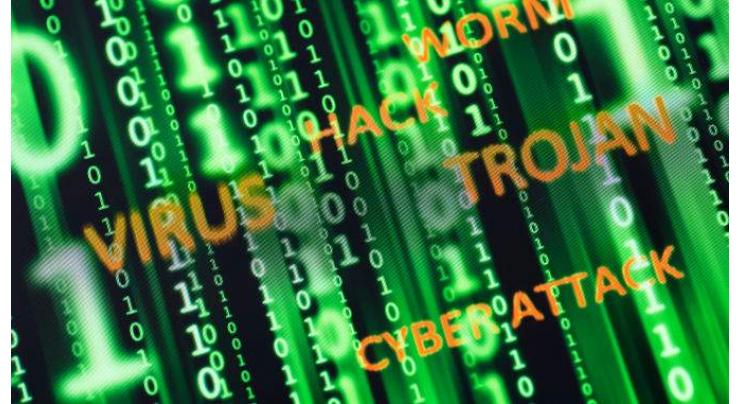
Regional Cyberattacks Increasing Exponentially, Says Expert
Umer Jamshaid Published September 11, 2019 | 10:30 AM

A cybersecurity expert has said that cyberattacks and breaches to critical infrastructure in the Middle East are increasing exponentially, leveraged by actors that want to flex their dominance in the region
ABU DHABI, (UrduPoint / Pakistan Point News / WAM - 11th Sep, 2019) A cybersecurity expert has said that cyberattacks and breaches to critical infrastructure in the middle East are increasing exponentially, leveraged by actors that want to flex their dominance in the region.
Darkmatter’s Senior Vice President for Managed Services, Eric Eifert, said that the region is growing tremendously in terms of innovation and new technologies that are outside of the oil and gas sector. "We see increases in investment in renewable energy – solar and wind," and as a result, "we’re seeing adversaries globally wanting to target that intellectual property" to use it for economic espionage.
"The region is very interesting as there are various threat actors that have good capabilities from a cyberattack standpoint," the Darkmatter representative told the Emirates news Agency, WAM.
A report recently released by the cybersecurity company highlights espionage and sabotage as two main techniques being utilised to seek illicit access to credentials and personally identifiable information to facilitate follow-on attacks.
These attacks can impact critical infrastructure, he explained, noting that different adversaries want to target infrastructure using cyberattacks as a "gambit for destructive attacks." He cited, as an example, the Saudi Aramco incident where computer systems were physically destroyed and had to be replaced.
Such attacks also have an operational impact on infrastructure capabilities, resulting in a reduction in production and distribution, Eifert continued. A hit on any of these critical infrastructure activities could disrupt the industry and harm the economy.
The Darkmatter Cyber Security Report, released this June, notes that half of all cyberattacks in the Middle East target the oil and gas sector, with an estimated 75 percent of regional oil and gas companies having their operational technology environment compromised.
"What we’re seeing is that those attack vectors are being leveraged both as gaining a foothold in certain critical infrastructures as a kind of prepositioning for an escalation of tensions -- where they can either use it as a mechanism to disrupt government or disrupt critical infrastructure," or even as means for actors to "flex their power or dominance in the region," Eifert noted.
He warned such actions could have a "catastrophic" impact on the region, adding that they can even be utilised as a means to "influence the politics within another country," while utilising methodologies to influence the local population, as well as global perspectives on the region.
Commenting on the economic impact such attacks can have, Eifert said, "We’re talking in the billions, if not trillions of Dollars. Anything that could impact production and distribution, just from an operational standpoint is tremendous."
He explained that if a gas turbine experienced a cyberattack, it would take four to five years to replace that asset. This, he added, has not only a direct monetary impact but also implies a reputational loss where customer confidence in institutions is also compromised.
"My biggest concern is anything that impacts humanity, the health and welfare of the human population," Eifert stressed, adding that cyberattacks "could have a drastic effect on our way of life."
The Darkmatter representative said that the cybersecurity industry is now creating the right technologies that provide visibility to understand the risk and threats arising from cyberattacks. "What governments and other stakeholders need to understand is that there is a credible threat out there, and we’ll see things like the Ukrainian incident where the Ukrainian power supply went down for several hours in the wintertime."
Related Topics
Recent Stories

PSX gains 771 points

PITB HR Wing organizes Eid Milan celebration for children at PITB Day Care Cente ..

Cabinet briefed on progress of PIA privatization

Meeting held to streamline trade between Pak-Afghan , Central Asian Republics

SONY x TECNO - is this for real?

Progress of Aaghosh, Bunyad, Khud Mukhtar programs discussed

SBP to announce monetary policy on April 29

London stocks hit new record peak on takeovers

Summer School on Understanding Greenhouse Gas Emission and Measurement Technique ..

Rupee sees slight recovery against US dollar

Govt to out source waste management companies to generate revenue

Rawat police arrest four robbers; recover Rs 700,000
More Stories From Middle East
-

UAE announces ‘Zero Bureaucracy Program’ to reduce bureaucracy
3 months ago -

COP28 President-Designate welcomes Transitional Committee agreement to operationalise Loss and Damag ..
6 months ago -

Global Media Congress 2023 to feature Co-Production Majlis as a new networking platform
6 months ago -

Young female athletes shine at Abu Dhabi World Youth Jiu-Jitsu Championship
6 months ago -

King of Jordan receives Abdullah bin Zayed and ministers participating in Arab coordination meeting
6 months ago -

Abdullah bin Zayed participates in coordination meeting of Arab foreign ministers, joint meeting wit ..
6 months ago
-

3rd annual conference of Emirates Society of Clinical Microbiology kicks off in Dubai
6 months ago -

SIBF 2023 hosts Nobel laureate to discuss emergence of ‘Afrofuturism’ in global discourse
6 months ago -

ALC announces winners of Kanz Al Jeel Award 2023
6 months ago -

SIBF turns spotlight on remarkable contributions of women
6 months ago -

Global assets in spot bitcoin ETFs hit $4.16 billion
6 months ago -

Rescuers struggle to find Nepal quake survivors as deaths reach 157
6 months ago











